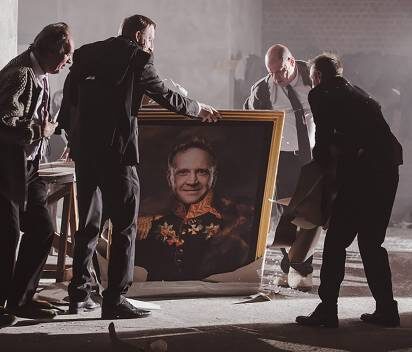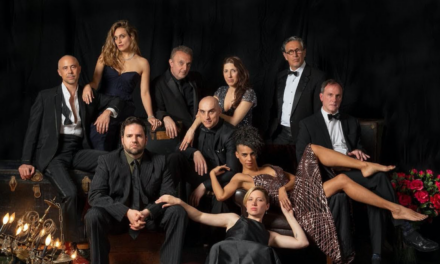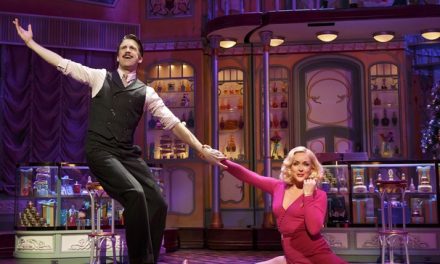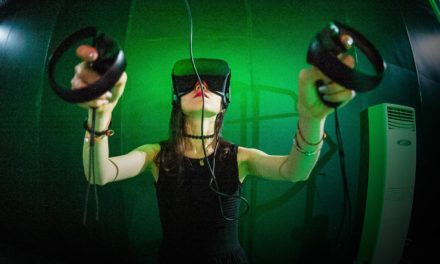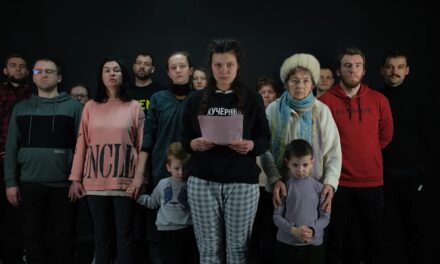This Fall, the international Theatre HD company Stage Russia enters its fifth season. With a variety of shows and genres to choose from, the company now offers an all-inclusive season pass. The 2021-2022 season opens this month with BORIS directed by Dmitry Krymov, a subversive adaptation of Pushkin’s Boris Godunov. The Theatre Times reconnected with Stage Russia’s founder Eddie Aronoff to discuss the upcoming season and its novelties.
Irina Yakubovskaya: The pandemic has irrevocably changed theatre everywhere. It has changed the way we think about access to live performances, it has forced theatre makers to experiment with multimedia and transmedia forms, and it certainly highlighted problematic areas of many cultural institutions. What did Stage Russia, as an organization, learn from these past two years?
Eddie Aronoff: It was a brutal time for live theatre, of course, but a little less so in Russia where government support of the arts was and is a way of life. I’m not saying managing directors here had an easy go of it. It was and continues to be a challenge, but, by and large, theatres in Russia are not private enterprises. For us, we actually benefitted a little from being able to stream our performances, organizing live Zoom events featuring some incredibly talented artists, which helped us expand our reach and personalize our content.
IY: Looking back at the early years of Stage Russia, I see a company that started out as a conduit for a traditional, mainstream repertoire. As the company enters its fifth season, it is embracing materials that are yet to be canonized, such as plays by contemporary and yet established Russian artists like Ivan Vyrypaev and Dmitry Krymov. What motivated this shift in the company’s choice of repertoire?
EA: One of the great things about being a niche product, which we are, is that we’re small enough to be nimble and experimental without risking a great deal. Having said that, Vyrypaev and Krymov are pretty safe bets. Krymov, in particular, is in the middle of a remarkable prolific run of prodigious works. We have two of them, but there are three more we’d love to film that he’s created in just the last 12 months! At the outset, when we began, our goal was to determine if the concept of presenting Russian theatre in western cinemas had legs. Once we established that there was a business there, it freed us a bit to play around with productions that excited us.
IY: Would it be fair to say that this upcoming season will tackle more dark and provocative themes? Without spoiling anything, could you tell potential viewers what the shows are about?
EA: I’d say less dark than provocative, and maybe less provocative than inclusive. On the surface, a political satire like “Boris” or the Who’s Afraid of Virginia Woolf-like “Sun Line” appear dark, but both are very funny, even playful. And while “Iran Conference” and “Finist the Brave Falcon” are provocative on one level, they both implore us to better understand one another, introducing us to themes that are rarely if ever touched upon. Krymov’s “Everyone is Here”, constructed using the timber of Wilder’s Our Town, is, well, just a masterpiece.
IY: Stage Russia has been eager to engage more of provincial theatre institutions and artists from all over Russia, beyond Moscow and Saint-Petersburg. During this outreach process, what challenges and successes did you encounter?
EA: From a practical standpoint engaging and working with provincial theatres pose some logistical difficulties, but with the pandemic came this idea of their filming their own work, which has opened up the possibility of more easily presenting it. And because the director of the stage production is often overseeing the film production, you get a finished product which often transcends typical theatre HD, a fuller vision of the work, at least. In working with lesser known theatre companies we lose some of the cache that comes with presenting something with a well-known set of actors, but we gain in other ways, particularly in shedding light on some really terrific productions.
IY: In your experience, how do the artists perceive the multimedia / HD TV form of their productions? Have you had conversations with directors, actors, designers, producers about their feelings on this digital extension of live performances? Additionally, since the launch of Stage Russia, has the audience of your shows changed, and how? What would you describe your target audience of the future?
EA: Ha! With a great deal of indifference! They’re thankful to us for getting their work out into the world, but that’s about the most, excitement-wise, I get from them. The idea of a film being made from a performance is antithetical to their perception of theatre, and, really, I understand. What we do, what the Met Opera does, or the National Theatre, it’s not meant to replace the living breathing atmosphere of a live performance. It can’t. It’s okay. We serve another purpose, which is useful in its own right. Our US/UK cinema audiences haven’t really changed much over the last five years, but we’ve brought in an entirely new crowd, far more international and younger, via streaming. And then we also work extensively with professors and educational streaming platforms, which has brought us an exciting third demographic. That, I hope, points us in the right direction for the future.
IY: How would you describe the role theatre plays in Russian life today? How does it differ from live theatre’s role in American culture, in your opinion? What, if anything, could the two cultures learn from each other’s theatre?
EA: If you’re comparing the Russian theatre system to local American theatre companies, the differences are less stark than comparing it with, say, Broadway, at least in terms of a repertoire approach. Financially, however, Russian theatre, as I mentioned, is propped up by governmental funding, whereas their US counterparts are often left to their own devices. This support begets a sense of art is an integral part of society. On the flip side, the bureaucracy involved in that can occasionally tend toward pencil pushing at the expense of artistic vision. There’s a delicate balance involved. Coincidentally, every performance we chose for this season is from either a private production company or from a non-profit theatre. You can take the American out of America, I guess, but you can’t take America out of the American.
This post was written by the author in their personal capacity.The opinions expressed in this article are the author’s own and do not reflect the view of The Theatre Times, their staff or collaborators.
This post was written by Irina Yakubovskaya.
The views expressed here belong to the author and do not necessarily reflect our views and opinions.

